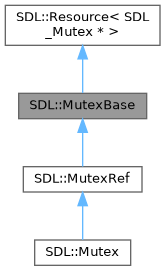A means to serialize access to a resource between threads. More...

Public Member Functions | |
| MutexBase () | |
| Create a new mutex. | |
| void | Lock () |
| Lock the mutex. | |
| void | TryLock () |
| Try to lock a mutex without blocking. | |
| void | Unlock () |
| Unlock the mutex. | |
| constexpr | Resource (T resource={}) |
| Constructs the underlying resource. | |
| constexpr | Resource (std::nullptr_t) |
| Equivalent to default ctor. | |
| constexpr | Resource (std::nullopt_t) |
| Equivalent to default ctor. | |
| Resource (const Resource &other)=delete | |
| Resource (Resource &&other)=delete | |
 Public Member Functions inherited from SDL::Resource< SDL_Mutex * > Public Member Functions inherited from SDL::Resource< SDL_Mutex * > | |
| constexpr | Resource (SDL_Mutex * resource={}) |
| Constructs the underlying resource. | |
| constexpr | Resource (std::nullptr_t) |
| Equivalent to default ctor. | |
| constexpr | Resource (std::nullopt_t) |
| Equivalent to default ctor. | |
| Resource (const Resource &other)=delete | |
| Resource (Resource &&other)=delete | |
| Resource & | operator= (const Resource &other)=delete |
| Resource & | operator= (Resource &&other)=delete |
| constexpr | operator bool () const |
| True if contains a valid resource. | |
| constexpr bool | operator== (const Resource &other) const=default |
| Comparison. | |
| constexpr bool | operator== (std::nullopt_t) const |
| Comparison. | |
| constexpr bool | operator== (std::nullptr_t) const |
| Comparison. | |
| constexpr SDL_Mutex * | get () const |
| Return contained resource;. | |
| constexpr SDL_Mutex * | release (SDL_Mutex * newResource={}) |
| Return contained resource and empties or replace value. | |
| constexpr const SDL_Mutex * | operator-> () const |
| Access to fields. | |
| constexpr SDL_Mutex * | operator-> () |
| Access to fields. | |
Detailed Description
Mutexes (short for "mutual exclusion") are a synchronization primitive that allows exactly one thread to proceed at a time.
Wikipedia has a thorough explanation of the concept:
https://en.wikipedia.org/wiki/Mutex
- Since
- This struct is available since SDL 3.2.0.
- Category:
- Resource
Constructor & Destructor Documentation
◆ MutexBase()
|
inline |
All newly-created mutexes begin in the unlocked state.
Calls to MutexBase.Lock() will not return while the mutex is locked by another thread. See MutexBase.TryLock() to attempt to lock without blocking.
SDL mutexes are reentrant.
- Postcondition
- the initialized and unlocked mutex or nullptr on failure; call GetError() for more information.
- Since
- This function is available since SDL 3.2.0.
Member Function Documentation
◆ Lock()
|
inline |
This will block until the mutex is available, which is to say it is in the unlocked state and the OS has chosen the caller as the next thread to lock it. Of all threads waiting to lock the mutex, only one may do so at a time.
It is legal for the owning thread to lock an already-locked mutex. It must unlock it the same number of times before it is actually made available for other threads in the system (this is known as a "recursive mutex").
This function does not fail; if mutex is nullptr, it will return immediately having locked nothing. If the mutex is valid, this function will always block until it can lock the mutex, and return with it locked.
- Since
- This function is available since SDL 3.2.0.
- See also
- MutexBase.TryLock
- MutexBase.Unlock
◆ TryLock()
|
inline |
This works just like MutexBase.Lock(), but if the mutex is not available, this function returns false immediately.
This technique is useful if you need exclusive access to a resource but don't want to wait for it, and will return to it to try again later.
This function returns true if passed a nullptr mutex.
- Exceptions
-
Error on failure.
- Since
- This function is available since SDL 3.2.0.
- See also
- MutexBase.Lock
- MutexBase.Unlock
◆ Unlock()
|
inline |
It is legal for the owning thread to lock an already-locked mutex. It must unlock it the same number of times before it is actually made available for other threads in the system (this is known as a "recursive mutex").
It is illegal to unlock a mutex that has not been locked by the current thread, and doing so results in undefined behavior.
- Since
- This function is available since SDL 3.2.0.
- See also
- MutexBase.Lock
- MutexBase.TryLock
The documentation for this struct was generated from the following file:
- SDL3pp/SDL3pp_mutex.h